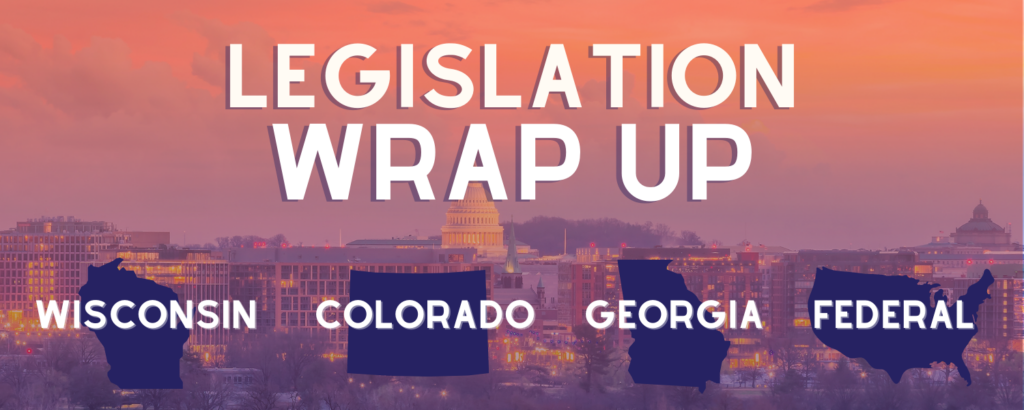
In February, we told you all about the legislation we were watching in Georgia, Colorado, Wisconsin, and at the federal level. Legislation sessions in Georgia and Colorado have come to an end and we’re back to hear from our state directors on the wins and what’s next.

Mica Whitfield, Georgia State Director
Winning Workplace Harassment in Georgia
We’re excited that Georgia took a huge first step forward in protecting workers from sexual harassment. HB 1390 passed unanimously in both chambers, signaling incredible support for survivors of sexual harassment in the workplace. This bill protects city and county workers from retaliation after they have made a complaint or reported sexual harassment.
We still need to protect all Georgia workers from sexual harassment in the workplace and this bill and the support it received is a huge stepping stone to getting those protections for survivors
Before this bill, Georgia had no state level protections for workers when they were sexually harassed in the workplace.
Together with the Respect Georgia Workers Alliance, we’ll keep fighting to make sure all survivors of sexual harassment have protections in the workplace. This past session we also introduced a more comprehensive worker protection bill that would cover all private employees in the state, HB 1389. We made a lot of progress on this bill as well, and we look forward to the promised continued conversations about this bill over the summer so that we’re ready to pass GA’s first anti-discrimination law to cover private sector workers.
What’s Next for Paid Leave
In the 2021 legislative session, we supported a bill that provided three weeks of paid parental leave to state and public school employees per year. We are proud of that accomplishment, and we know that far too many Georgians still don’t have access to paid leave.
This year, we introduced HB 1517, which would create a paid family and medical leave insurance fund that would cover private sector workers in Georgia for 12 weeks of paid medical and family leave. It creates an inclusive definition of family and it includes wage replacement rates that are highest for lowest wage earning workers, ensuring that those who need it most would be able to afford to take the time off. It would create an insurance program that the State would administer that employees and employers pay into 50/50. The policy also includes job protection and protections against retaliation for taking leave.
While the bill didn’t move as far as we’d hoped, we have this model of legislation as an example of the structural fix that families need and deserve to move forward with next year.
Other Updates
- HB 1177, a bill that included a salary history ban provision, ensuring that wages are not based on past salaries which allows pay discrimination to follow women and people of color from job to job, didn’t gain traction this session. We had some important conversations with lawmakers about this issue, and we’re looking forward to continuing to push for meaningful legislation that would address the issue of pay equity in our state.
- We helped pass the Good Childhood Lead Poisoning Prevention bill.
- We also had a hand in stopping a bad bill related to the unemployment insurance system, which desperately needs modernizing. We’re hopeful that by defeating HB 1045 the system will get more of the funding it needs for much needed updates to technology and other improved processes within the system.
- We also defeated several bad bills targeting people who are experiencing homelessness and some harmful bills that falsely claimed to address housing affordability but in reality would have taken local control away from cities and counties to regulate policies related to tenants and landlords.

Winning Mobile Home Protections in Colorado
Dre Chiriboga-Flor, Colorado State Director
Since 2014, 9to5 Colorado has been at the forefront of mobile home organizing in the state. Many important protections were enacted by passing the Mobile Home Park Act in 2019, but our members were continuing to struggle with high lot rent increases and a lack of enforcement of the dispute resolution program. This session, one of our main legislative priorities was to stabilize lot rent and increase stability for residents. After a tough fight, we passed HB1287 “Protections for Mobile Home Park Owners” and SB160 “Loan Program Resident-Owned Communities” which were both recently signed into law.
The version of 1287 that will be signed into law includes two disappointing cuts. The bill will not include a rent stabilization measure to protect residents from the astronomically rising rents they have seen in recent years, and we also hoped to give residents more time to organize a purchase of their park. It still includes major improvements to the mobile home parks’ oversight program and relocation assistance funds, which we celebrate as added protections for mobile home residents. HB1287 will help residents by:
- Providing residents 120 days to purchase the parks they live in if their landlord decides to sell
- Requiring owners to take better care of common areas and utilities such as the water
- Requiring owners to compensate renters for the cost of moving their homes
SB160 will help provide financing to eligible mobile home homeowners so they can purchase the land under their homes when their community is up for sale. The wins and challenges of this session only fuels our fight for housing justice in years to come.
More to celebrate!
HB22-1133, a bill that secures financing for Colorado’s Paid Family and Medical Leave program, passed through the legislature seamlessly. This bill will help keep the insurance program on track for worker benefits in 2024. The next steps in the implementation process will be continuing to write the rules and regulations, begin premium collection next year, and hire state workers to staff FAMLI.
HB22-1314, nicknamed the “Towing Bill of Rights” also passed – a victory for working class Coloradans. The bill will add regulations to the exploitative towing industry and ensure folks won’t have to pay exorbitant fees to get their vehicle back.
We also celebrate the monumental wins of our partners for passing the Reproductive Health Equity Act, which will protect the right for Coloradoans to choose when or if they have children and the Unemployment Compensation bill which are huge wins for our communities. Check out our full legislative wrap-up available in English and Spanish.

Christina Thor, Wisconsin State Director
Winning Paid Parental Leave
On Tuesday, April 12, Milwaukee County passed its paid parental leave ordinance which grants 8 weeks of paid leave for working parents. This is an incredible first step in the fight for paid leave in Wisconsin. As I said in my remarks at the signing, “This is an urgent wake up call for businesses and other employers in Milwaukee and Wisconsin to follow. Paid leave is a win for everyone. We need more employers to set up systems that support people. After all, people make up 100% of our workforce. Let’s work together to build a culture that encourages and values employees as caretakers and as dignified people. Paid leave policies increase employee retention, attract and retain talent, increase productivity and boost employee morale, support the mental health and well-being of parents, and provide an opportunity for private and public investment.”

A National Note
Leng Leng Chancey, Executive Director
I’ll be honest- there just haven’t been a lot of national wins to celebrate recently. I’m incredibly frustrated with the failure to pass Build Back Better, the John Lewis Voting Rights Act, abortion protection, and other legislation that would help our communities thrive. Like you, I’m worried for our communities and families as we head into another surge of the pandemic without paid leave and other resources, I’m disheartened by continued racist, misogynistic, and preventable gun violence in the communities of people of color, and I await the Supreme Court’s ruling on abortion with a heavy heart.
It’s never been more important to make sure that you and everyone in your communities are registered to vote. In November we have to make sure that our voices are heard in our local communities, our states, and nationally.

